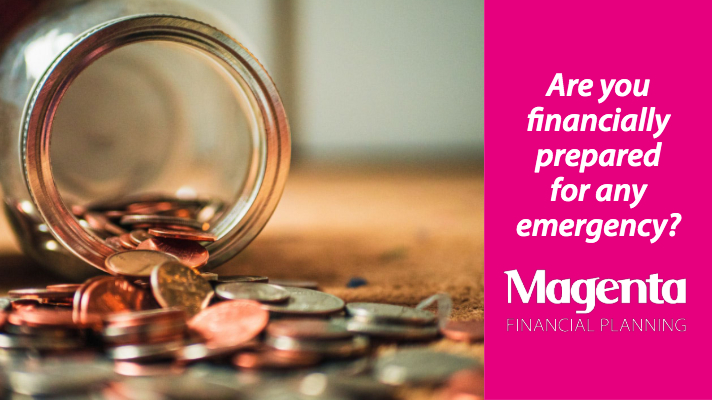Do you have a disaster plan?
Emergencies can strike anybody at anytime. Most emergencies will require some kind of financial intervention. We can’t control emergencies, but we can be prepared, especially financially.
Having an emergency fund in place will provide security and confidence that we can deal with the unexpected things that life throws at us.
Generally speaking, we think that a useful emergency fund should be around 6 months of normal after tax income. But each of us should have an emergency fund suitable for our individual lifestyle.
We have listed 5 types of emergency where immediate access to money may prove essential.
1. Health emergency
Health emergencies can strike anyone at anytime, even if we are quite healthy. A heart attack; being knocked off a bike; childhood meningitis – all are unexpected, but the consequences are easily foreseen. Time off work; travel to and from hospitals; care costs for children; extra food for visitors etc.
The NHS and health insurance plans can take care of some of the costs, but not all of them. With some insurance plans we have to pay first and claim back later. If we have our own business and need to get back to work, we may even need to pay for the necessary treatment to get better faster.
2. Death in the family
This can be emotionally devastating. More so, if it is sudden and unexpected. At the same time as dealing with the grief, we may also need to deal with financial issues. There will be a funeral to pay for; there may be immediate debts to repay; if the deceased’s bank account is frozen, dependents may need financial help until the estate is settled. We may need to dip into our emergency fund for any or all these things.
But what if this happens to us? Have we left our affairs in good enough shape so that if we die, our family can manage financially? This is likely to need more than 6 months income and is the reason why most people transfer this risk to an insurance company.
3. Loss of income (job loss/ loss in business)
Job losses are not uncommon, especially in today’s fast paced world where “disruption” is becoming a buzzword. Jobs are lost and businesses fail for many reasons, often again outside our control.
An emergency fund will help us to meet our family needs without too much stress, while we look for other work.
4. Breakdowns and one offs
Things always breakdown at the worse possible times – boilers in the winter; cars on the motorway; a laptop just before an important presentation; the washing machine fully of dirty rugby kit etc.
Then there are other events – pet illnesses; a leaky roof; a stolen mobile; a broken headlight etc
This is just life, but many of these events could bring our lives to a sharp halt if we don’t have the money to fix them quickly. If we can’t use the car, we can’t get to work etc…
By saving a little each month into an “emergency fund” pot, we can always be sure that these things can be covered and dealt with quickly.
5. Last-minute travel plans
Sometimes it is necessary to travel at short notice to deal with some of the other emergencies mentioned above.
But this is usually the most expensive way to travel because the travel companies know that you have no choice if you need to visit a sick relative or cut short a holiday due to illness etc.
In this case, not only is an emergency fund essential, but it also needs to be accessible from wherever you are in the world.
While we may not be able to plan for unexpected future events, we can be financially prepared to deal with them.
Give some thought to some of the things that you might need money for in an emergency and start putting together your emergency fund.
If you would like to know more, do call us for a friendly chat.

